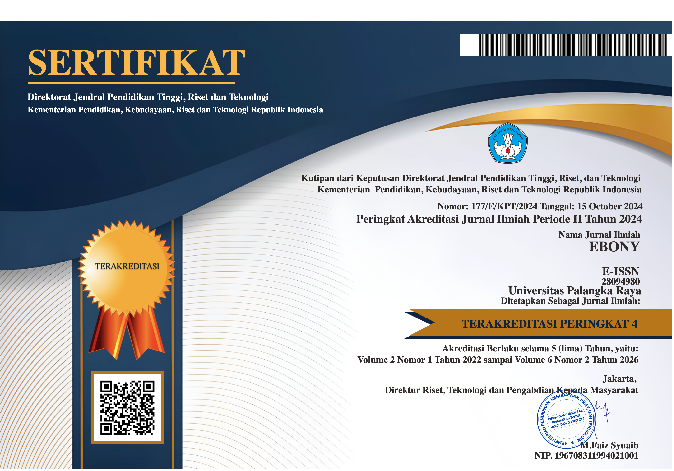The Effect of U-Dictionary on Vowel Pronunciation Ability of the Tenth Grade Students
DOI:
https://doi.org/10.37304/ebony.v1i1.3099Keywords:
pronunciation ability, U-Dictionary, vowelAbstract
The objective of this research was to find out the empirical data which could determine whether there is a significance of using U-Dictionary application on vowel pronunciation ability of the tenth-grade students of SMA Kristen Palangka Raya or not. The method used quantitative with pre-experimental research method with One Group Pretest-Posttest Design. The samples of this research were 30 students of the tenth grade. The samples were selected by total sampling. To collect the data, this research used a pronunciation test which had been tried out provided in pretest and posttest as the research instrument. The result of this research revealed that the mean score of the posttest was greater than that of the pretest, namely 66.33 > 49.17. Then the result of hypotheses testing showed that the critical value for the one-tailed test is ta with df = n-1, 30-1 = 29. The value of the test statistic, is t* = -6.809 and the critical value of t0 is t.05 {29} = - 1.699. Because t*< t.05 {29} = -6.809 < -1.699, we reject H0. The test results were statically significant at the 5% level. It means that there is a significant effect of using the U-Dictionary application on the vowel pronunciation ability of the students of SMA Kristen Palangka Raya.
Downloads
References
Alfallaj, F. (2013). The use of linguistics in teaching pronunciation to Saudi students. SUST Journal of Humanities, 14(2), p. 134-143.
Alhaisoni, E. (2016). EFL teachers’ and students’ perceptions of dictionary use and preferences. International Journal of Linguistics, 8(6), p. 31-52
Dalton, C. & Seidlhofer, B. (2001). Language Teaching Pronunciation Book. New York: Oxford Press University.
Dashtestani, R. (2015). EFL teachers’ and students’ perspectives on the use of electronic dictionaries for learning English. Computer Assisted Language Learning Electronic Journal, 14(2), p. 51-65
Dwaik, R. (2015). English digital dictionaries as valuable blended learning tools for Palestinian college students. English Language Teaching, 8(11), p. 1-10.
Gerald, K. (2000). How to Teach Pronunciation. England: Pearson Education Limited.
Gilakjani, A.P. (2012). A study of factors affecting EFL learners’ English pronunciation learning and the strategies for instruction. International Journal of Humanities and Social Science, 2(3), p. 119-123.
Gilakjani, A.P. (2016). English pronunciation instruction: A literature review. International Journal of Research in English Education, 1(1), p. 1-6
Harmer, J. (2009). The Practice of English Language Teaching. New York: Longman Publishing.
Jones, D. (2000). English Pronunciation Dictionary. New York: Cambridge University.
Kent, D. (2001). Korean university freshmen’s’ dictionary use and perceptions regarding dictionaries. The Korea TESOL Journal, 4(1), p. 73-92.
Leong, L.M. & Ahmadi, S.M. (2017). An analysis of factors influencing learners’ English speaking skill. International Journal of Research in English Education, 2(1), p. 34-41.
Metruk, R. (2017). The use of electronic dictionaries for pronunciation practice by university EFL students. Teaching English with Technology Journal, 17(4), p. 38-51.
Singleton, D. (2016). Language and the Lexicon. An Introduction. New York: Routledge.
Zheng, H., & Wang, X. (2016). The use of electronic dictionaries in EFL classroom. Studies in English Language Teaching, 4(1), p. 144-456.
Downloads
Published
How to Cite
Issue
Section
License

This work is licensed under a Creative Commons Attribution-NonCommercial 4.0 International License.











